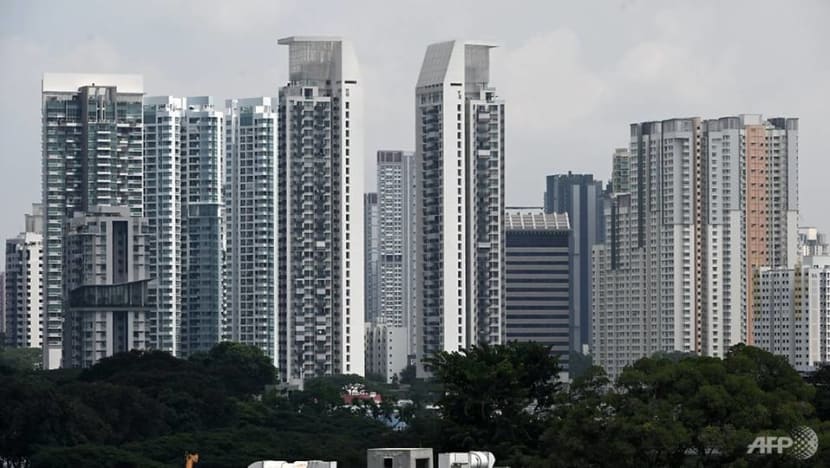Virtual tours and opportunities: The Singapore property market during COVID-19
Singapore is now in the first phase of the post-circuit breaker period. Some sectors of the economy have reopened, but it isn’t quite business as usual in the property sector. Money Mind reports.

File photo of apartment buildings in Singapore. (Photo: AFP/Roslan Rahman)
SINGAPORE: Singapore is now in the first phase of the post-circuit breaker period. Some sectors of the economy have reopened, but it isn’t quite business as usual in the property sector.
Developers’ show galleries remain closed, and property agents are still unable to conduct face-to-face meetings or viewings with prospective buyers.
Amid these challenging operating conditions, new private home sales fell 12 per cent in the first quarter. In the same period, prices fell 1 per cent.
Most market watchers expect prices to continue this downward trend.
Ms Christine Sun, head of research and consultancy at OrangeTee & Tie, said that she expects private home prices to decline between 3 and 5 per cent, although certain segments of the property market will do better than others.
"We are not expecting it to be uniform across the whole industry because it really depends very much on the market segment," said Ms Sun.
She also pointed out that some of the mass market projects have been selling up to 70 per cent of their units.
“But if you look at other segments, for instance like the resale market, there could be more price pressure, possibly because many of the individual sellers’ holding power may not be as strong as the developers. Or they may face ongoing competition from the supply of new homes.
RESILIENCE
Every crisis brings with it price volatility, but analysts said that historically, property prices in Singapore have always recovered quickly after each economic shock.
This was the case during the Asian financial crisis more than two decades ago, as well as during the 2007-2008 global financial crisis.
PropNex Realty CEO Ismail Gafoor, who described the situation towards the end of 2008 as “panic”, said that the current situation is different because the whole world has been affected by the pandemic.
“One of the biggest concerns at that time was not knowing where the bottom was, who was going to go bankrupt and how many of us would be dragged into it,” said Mr Ismail of the 2008 crisis.
Such uncertainty led to panic selling in the real estate market in Singapore, and prices dropped 25 per cent in three quarters. Prices then quickly recovered in 2009.
During the global financial crisis, many investors were affected by the situation in the United States, said Mr Ismail.
The current pandemic, however, has shut down the entire world “so nobody is panicking, no developer is slashing prices and therefore people are holding and people are accepting that this is something that needs patience to ride over,” he added.
He expects that property prices will be able to remain at a "reasonably strong position" because of demand from foreign interest and government policies.
Singapore has introduced various measures to maintain stability in the property market, including the total debt servicing ratio and the mortgage servicing ratio.
Last month, it was also announced that buyers who entered into agreements to purchase homes from developers can apply for temporary legal protection should they face difficulties making payments because of the COVID-19 pandemic.
READ: COVID-19: Legal relief for those who buy homes from developers
PODCAST: COVID-19 and the outlook for Singapore’s residential property market in 2020 and beyond
Another difference from the 2008 crisis is that interest rates are at historically low levels, meaning it is cheaper now to get a housing loan.
Analysts said this has spurred both locals and foreigners to continue to shop for property in Singapore.
ERA said it sealed several deals with Chinese buyers during the circuit breaker period, after giving them virtual tours.
“Because the yuan is depreciating, [Chinese buyers] are actually looking to invest overseas to preserve their wealth ... And Singapore naturally being a safe haven and being very well managed and a safe place, attracts these type of buyers," said Mr Eugene Lim is key executive officer at ERA Real Estate.
Market watchers also said that developers have limited room to cut prices.
Mr Vijay Natarajan, assistant vice-president of real estate at RHB Securities, noted that during past crises, the margins for developers were “quite healthy” at about 20 to 30 per cent.
“This time around, the margins have fallen. There has been quite a bit of competition to acquire land. Because of the recent en bloc cycle, developers are sitting on expensive land banks. Going forward, construction costs are going to rise. This is going to put pressure on the developer margins which are already low at around 5 to 15 percent, so considering these factors, developers have much less room to cut property prices going forward,” he said.
Analysts also said that the HDB resale market will remain relatively stable during this period.
“In the past years, we have seen that even through crisis periods, HDB prices tend to remain relatively stable and if it does come down, it is at a measured pace. Similarly if it does go up over time, it is also at a measured pace ... It’s not affected by the ups and downs of market sentiment, largely because such flats are bought and sold for owner occupation,” said Mr Lim.
The current situation does provide some opportunities for buyers, said Mr Ismail.
"Many of us probably wished we had bought properties during the SARS outbreak of 2003, or during the 2008 global financial crisis. Today, [prices are] not dropping hugely. But developers are pricing sensitively with low profit margins and with some discounts. At the same time, in the resale market, the buyers are not asking for huge prices, knowing the current market sentiment. So there are opportunities for buyers,” he said.
BOOKMARK THIS: Our comprehensive coverage of the coronavirus outbreak and its developments
Download our app or subscribe to our Telegram channel for the latest updates on the coronavirus outbreak: https://cna.asia/telegram















